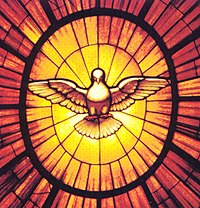Veni Sancte Spiritus

Veni Sancte Spiritus, sometimes called the "Golden Sequence," is a sequence prescribed in the Roman Liturgy for the Masses of Pentecost and its octave, exclusive of the following Sunday.[1] It is usually attributed to either the thirteenth-century Pope Innocent III or to the Archbishop of Canterbury Stephen Langton, although it has been attributed to others as well.
Veni Sancte Spiritus is one of only four medieval Sequences which were preserved in the Missale Romanum published in 1570 following the Council of Trent (1545-63). Before Trent many feasts had their own sequences.[2] It is still sung today.
It has been set to music by a number of composers, especially during the Renaissance, including Dufay, Josquin, Willaert, Palestrina, John Dunstaple, Lassus, Victoria, and Byrd. Later composers who have set the text include Morten Lauridsen and Frank La Rocca.
Text
| Latin text | English version |
|---|---|
|
|
References
- ^ Liber Usualis, pp. 880-81. Solesmes 1961.
- ^ David Hiley, Western Plainchant : A Handbook (OUP, 1993), II.22, pp.172-195
External links
- H.T. Henry. Veni Sancte Spiritus, in the Catholic Encyclopedia (1917)
- John Caldwell: 'Veni Sancte Spiritus', Grove Music Online ed. L. Macy (Accessed 28 June 2006), <http://www.grovemusic.com>


